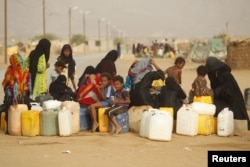GENEVA, SWITZERLAND —
Senior U.N. officials say improving humanitarian conditions in Yemen is critical for the country's future stability. The officials say the international community can help the fractured country by supporting the short-term and long-term needs of millions of destitute people.
Yemen is one of the poorest, most deprived countries in the world. The United Nations reports 14.7 million people, more than half the population, needs assistance this year.
It said millions had no access to safe drinking water and that Yemen has the second highest rate of malnutrition in the world, with one million children under age five suffering from growth-stunting or acute malnutrition.
The U.N. is appealing for $591 million to provide humanitarian aid for about half of these destitute Yemenis.
In addition, Yemen is hosting nearly a quarter-million registered refugees from the Horn of Africa, mainly from Somalia. It also cares for 400,000 people forced to flee their homes because of conflicts in the north and south of the country.
U.N. officials report progress is being made toward political solutions for these conflicts, and this bodes well for the future stability of the country.
The U.N. resident and humanitarian coordinator for Yemen, Ismail Ould Cheikh Ahmed, said the international community had an opportunity to help stabilize Yemen - an opportunity that he said should not be missed.
“In order to stabilize Yemen, we need to realize unless we create jobs for the young, the youth - unless we are able to provide food assistance for those life-saving activities or health. You know close to eight-million people today cannot have adequate access to health, medical facilities. So, if we do not address these, I am saying then we will not be able to stabilize the country," said Ahmed.
Director of the U.N. Office for Coordination of Humanitarian Affairs in Yemen Trond Jensen concurred with this assessment. He noted the political process, which has been going on for close to two years, was very fragile. He said people had to see a real change in their lives for that process not to fail.
“There is a huge number of hungry people. There are huge numbers of people who do not have access to the most basic of services, who do not have access to rule of law - to protection, etc., and that has the potential to undermine the political process. And in that process, I think it is important that the international community stand by the government of Yemen to make sure that those gains - call them peace dividends if you like -- that there are tangible progress for the average Yemeni in terms of having access to food, not having to starve, not having to see the children suffer,” he said.
Jensen said the U.N. humanitarian operation would emphasize life-saving support for the most vulnerable people.
But after the immediate needs are met, he said, U.N. agencies would move toward recovery. That, he said, would include building resilience in communities, efforts to remove landmines, and restoring rural livelihoods.
Yemen is one of the poorest, most deprived countries in the world. The United Nations reports 14.7 million people, more than half the population, needs assistance this year.
It said millions had no access to safe drinking water and that Yemen has the second highest rate of malnutrition in the world, with one million children under age five suffering from growth-stunting or acute malnutrition.
The U.N. is appealing for $591 million to provide humanitarian aid for about half of these destitute Yemenis.
In addition, Yemen is hosting nearly a quarter-million registered refugees from the Horn of Africa, mainly from Somalia. It also cares for 400,000 people forced to flee their homes because of conflicts in the north and south of the country.
U.N. officials report progress is being made toward political solutions for these conflicts, and this bodes well for the future stability of the country.
The U.N. resident and humanitarian coordinator for Yemen, Ismail Ould Cheikh Ahmed, said the international community had an opportunity to help stabilize Yemen - an opportunity that he said should not be missed.
“In order to stabilize Yemen, we need to realize unless we create jobs for the young, the youth - unless we are able to provide food assistance for those life-saving activities or health. You know close to eight-million people today cannot have adequate access to health, medical facilities. So, if we do not address these, I am saying then we will not be able to stabilize the country," said Ahmed.
Director of the U.N. Office for Coordination of Humanitarian Affairs in Yemen Trond Jensen concurred with this assessment. He noted the political process, which has been going on for close to two years, was very fragile. He said people had to see a real change in their lives for that process not to fail.
“There is a huge number of hungry people. There are huge numbers of people who do not have access to the most basic of services, who do not have access to rule of law - to protection, etc., and that has the potential to undermine the political process. And in that process, I think it is important that the international community stand by the government of Yemen to make sure that those gains - call them peace dividends if you like -- that there are tangible progress for the average Yemeni in terms of having access to food, not having to starve, not having to see the children suffer,” he said.
Jensen said the U.N. humanitarian operation would emphasize life-saving support for the most vulnerable people.
But after the immediate needs are met, he said, U.N. agencies would move toward recovery. That, he said, would include building resilience in communities, efforts to remove landmines, and restoring rural livelihoods.





